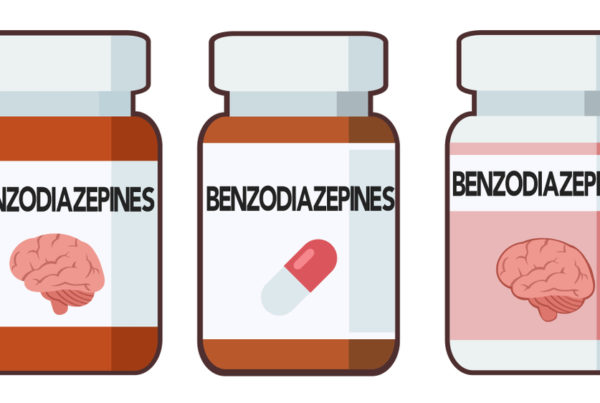Benzodiazepines, or benzos, belong to a class of medications known as sedative-hypnotics. These psychoactive substances are classified by the United States Drug Enforcement Administration (DEA) as Schedule IV Controlled Substances, meaning they are “defined as drugs with a low potential for abuse and low risk of dependence.” When used properly, benzodiazepines can be effective in treating a variety of ailments. The U.S. Food and Drug Administration (FDA) has approved benzodiazepines specifically for use in the treatment of generalized anxiety disorder (GAD), insomnia, social anxiety disorder, seizure disorders, and panic disorders. Medical News Today explains that benzodiazepines “alter the activity of the neurons that trigger stress and anxiety reactions.” When ingested, benzodiazepines affect one’s system by enhancing the effects of the neurotransmitter, known as GABA (gamma-aminobutyric acid). GABA is a neurotransmitter that sends calming messages to the body. Benzodiazepines work by interacting with the natural functioning of one’s brain and central nervous system, and when abused can increase one’s risk for developing a variety of adverse short- and long-term effects. Excessive benzodiazepine abuse can lead to any of the following, provided by the American Academy of Family Physicians:
- Cognitive dysfunction
- Memory challenges
- Loss of inhibition
- Impulsive behavior
- Labored breathing
- Headaches
- Elevated heart rate
- Insomnia
- Panic attacks
- Paranoia
- Mood swings
- Hallucinations
- Suicidal ideation
- Anxiety
- Difficulty completing familiar tasks
- Decreased emotional regulation
Furthermore, there have been new studies that correlate long-term benzodiazepine abuse with an increased risk of dementia and/ or Alzheimer’s disease. Fortunately, research indicates that after being free from benzos for an extended period, many of the changes made by benzodiazepines to the different regions of the brain after prolonged use may be reversed. This can be largely attributed to neuroplasticity.
Neuroplasticity
Frontiers In Psychology defines neuroplasticity as “a general umbrella term that refers to the brain’s ability to modify, change, and adapt both structure and function throughout life and in response to experience.” Neural pathways are developed through synaptic connections that occur in one’s brain, directly resulting from a person’s habits and behaviors. These connections create a map of circuits within one’s brain, influenced by outside stimuli, enabling the brain to process various experiences, and are essential in how the brain retains and accesses information. Neural pathways strengthen with repetition and can similarly become obsolete without repetition. Because the brain is a continuously evolving organ, it has the propensity to heal and, in some cases, reverse the damage that occurred due to the abuse of benzodiazepines.
For Information and Support
If you are concerned for yourself or a loved one regarding substance abuse and/ or addiction, we recommend reaching out for help as soon as possible. If left untreated, substance abuse can result in long-lasting and potentially life-threatening consequences. Keep in mind: you are not alone! There is an entire network of professionals that are available to help and support you and your loved one throughout the recovery process. The earlier you seek support, the sooner your loved one can return to a happy, healthy, and fulfilling life.
Please do not hesitate to reach out with any questions regarding our specific program at Haven House Addiction Treatment and/ or general substance abuse and/ or addiction treatment-related information. Our highly trained staff is readily available to discuss how we might best be able to help you and your loved one. We can be reached by phone at 424-258-6792. You are also welcome to contact anytime us via email at admissions@hhtxc.com.



